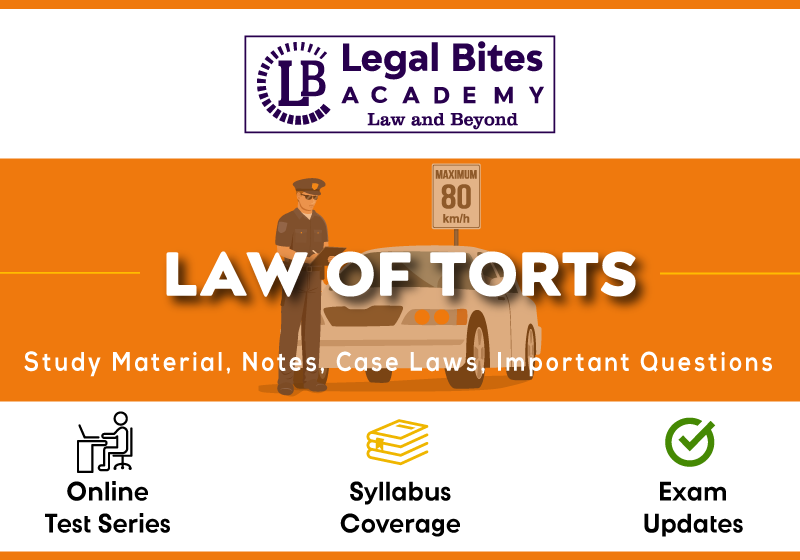Law of Torts - Notes, Case Laws And Study Material
Master the Law of Torts: Notes, Case Laws, and Study Material. Your comprehensive guide to tort law studies!

Law of Torts deals with civil wrong. This is basically a breach of a duty imposed by law, which gives rise to a civil right of action for a remedy not exclusive to any other area of law. The Law of torts came to India through England. In 1065 England was conquered by Normans, who were the French-speaking people of Normandy, a region of France.
After the Norman Conquest, French become the spoken language in the courts in England, and thus many technical terms in English Law owe their origin to French, and tort is one of them. The word tort is based on the idea that everyone in society has certain rights. The tort law's purpose is to enforce the rights and duties.
Important articles and study material on the Law of torts – Click on the link to Read.
Module: 1
- An Introduction to Tort Law
- 1000+ Detailed Questions MCQ Test Series for Competitions (Redirects to Law Aspirants)
- Law of Torts and Consumer Protection Questions Asked in UGC NET Exam | UGC NET (Law) #Special
- Essentials of the Law of Torts | Explained
- Pigeon Hole Theory – Salmond's Theory of Law of Torts
- Case Analysis: Donoghue v. Stevenson 1932
- 13 Landmark Decisions in Indian Tort Law | Explained
- Five Important Legal Maxims in Law of Torts
Module: 2
- Malicious Prosecution: Essentials and Defence
- The Law of Defamation: Kinds, Essentials and Defences
- Volenti non fit injuria; Concept, Meaning and Case Laws
- Act of God (Vis major) in Tort Law
- Novus Actus Interveniens: Meaning, Elements and Exceptions
- Remoteness of Damages
Module: 3
- Tortious Liability: Conditions and Constituents
- Tortious Liability: Negligence
- Relevancy of Motive in Tortious Liability
- Liability of the Administration; Concept and Explanation
- Principle of Absolute Liability: Evolution and LG Polymers Vizag
- No-Fault Liability under the Motor Vehicles Act, 1988
- Doctrine Of Sovereign Immunity: The Development In India
Module: 4
- Concept of Negligence in The Sphere of Civil Law
- Nuisance under Law of Torts: Concept and Explanation
- Medical and Professional Negligence
- Trespass to Person: Assault, Battery and False Imprisonment
- Parties & their Capacities to Sue & be Sued in Tort Law: Overview
Module: 5
- History and Development of Consumer Protection Laws in India
- Intent and Reasons Behind the Consumer Protection Act 1986
- Important Definitions Under the Consumer Protection Act
- Agencies Created for Consumer Redressal: Overview
- How to File a Consumer Complaint: Step-by-Step Guide
Module: 6
Law of Torts Mains Question Answer Series: Important Questions for Judiciary, APO & University Exams
- Law of Torts Mains Question Answer Series Part I
- Law of Torts Mains Question Answer Series Part II
- Law of Torts Mains Question Answer Series Part III
- Law of Torts Mains Question Answer Series Part IV
- Law of Torts Mains Question Answer Series Part V
- Law of Torts Mains Question Answer Series Part VI
- Law of Torts Mains Question Answer Series Part VII
- Law of Torts Mains Question Answer Series Part VIII
Module: 7
Other Important Articles
- Damnum Sine Injuria and Injuria Sine Damnum
- Assault, Battery and Mayhem – Trespass to the Person
- General Defences – Defence Against Tortious Liability
- Vicarious Liability – Concept, Origin and Relations governed by it
- Rules of Strict and Absolute Liability
- Absolute Liability: A Journey from Strict Liability
- Contributory and Composite Negligence
- Remedies in Torts
Your valuable feedback in the form of comments or any desired inputs are encouraged and always welcome. Every contribution toward a goal is valuable, regardless of how small it may be.

